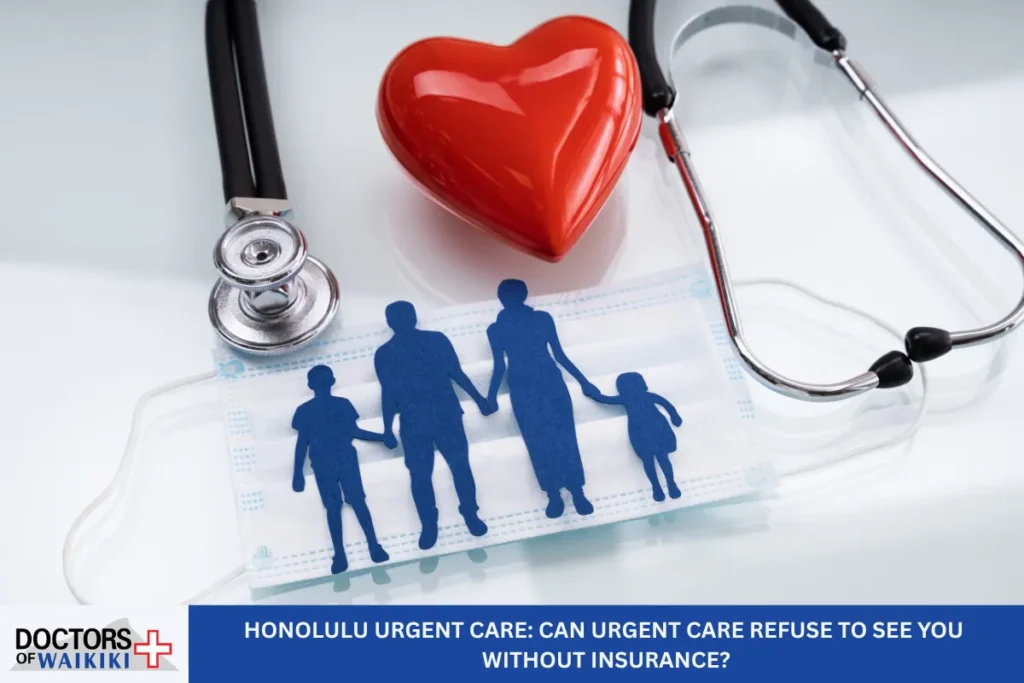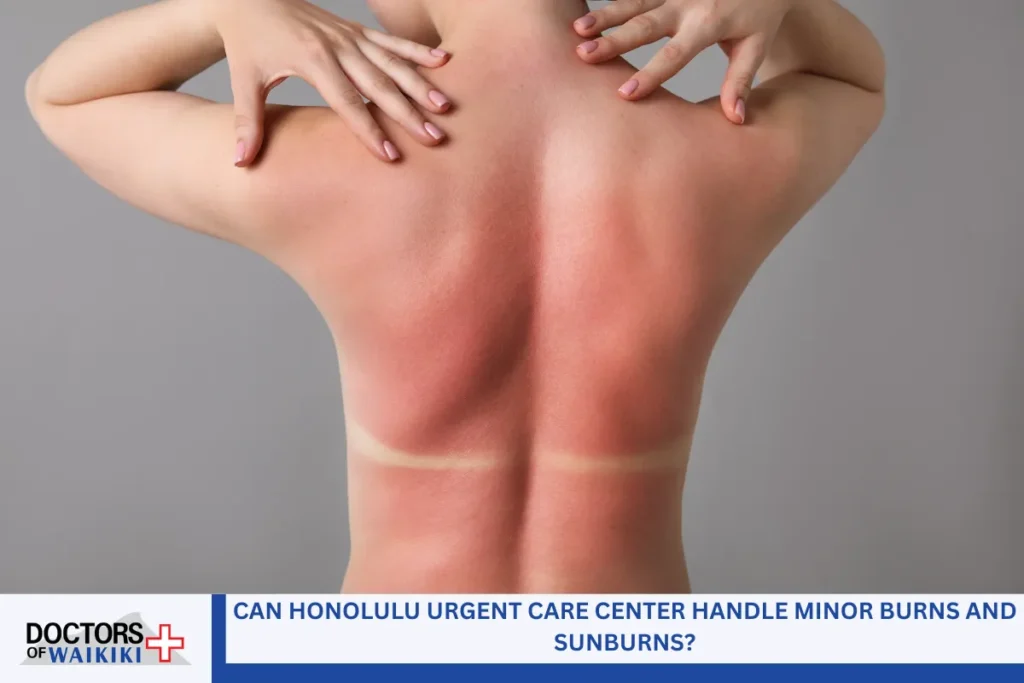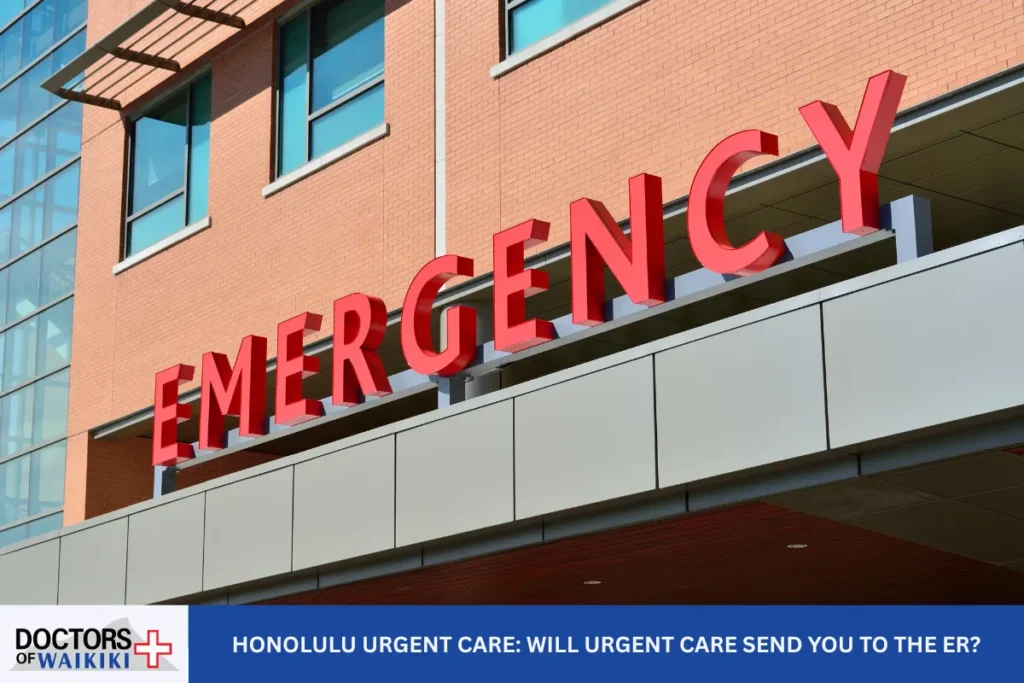If you’re searching for “Honolulu urgent care” and are wondering if an urgent care clinic can refuse to see you without insurance, you’re not alone. Maybe you have a cold, a sprained ankle, or need COVID testing, but don’t have coverage. The worry of being turned away when you’re not feeling your best can be stressful when you need medical attention right away. This situation can happen to locals, students, or even tourists in Waikiki or Oahu who aren’t familiar with the local healthcare scene. The good news? By knowing your rights, understanding urgent care options, and learning about costs and policies, you can take control of your health—even without an insurance card or health plan.
What Happens If You Don’t Have Insurance in Honolulu at an Urgent Care Center?
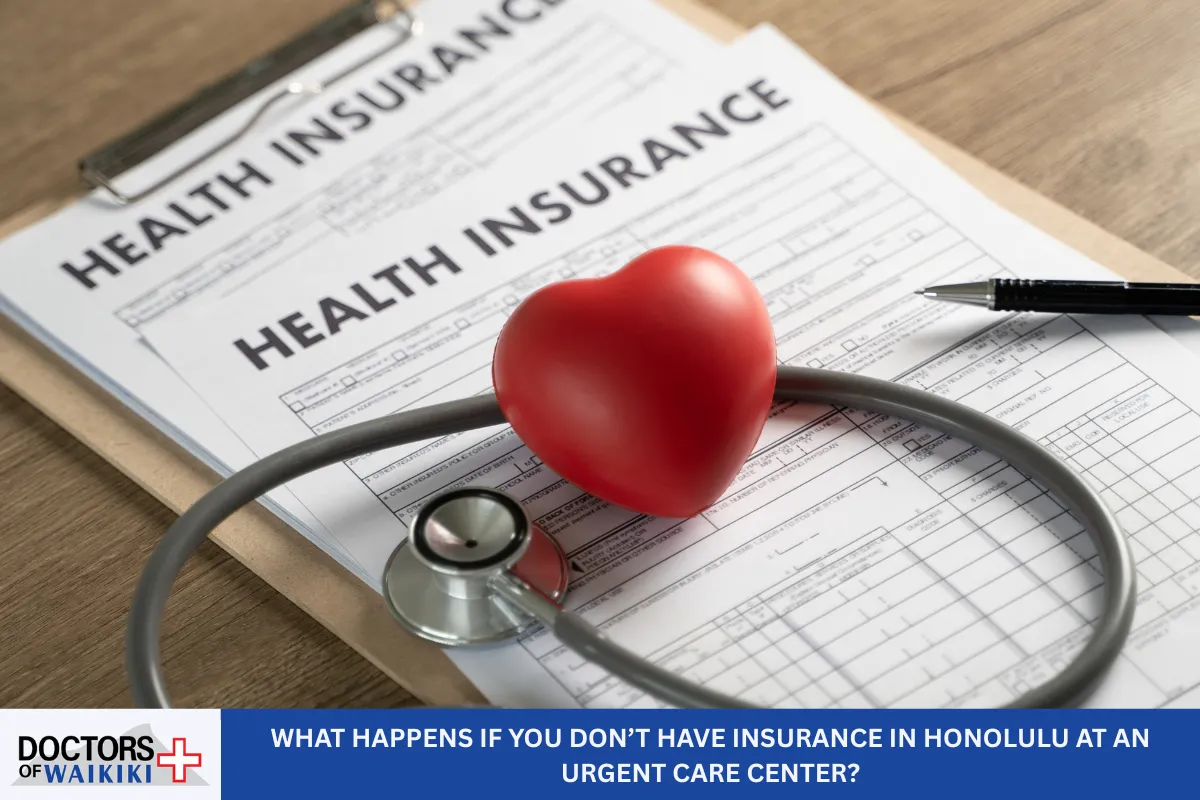
If you visit a walk-in clinic or urgent care center in Honolulu, HI and you don’t have health insurance coverage, you probably wonder: “Can they refuse to treat me?” Here’s what you need to know.
Urgent Care: Private Clinic Rules
Urgent care centers—including those in Honolulu, Waikiki, and Oahu—are typically privately run outpatient clinics designed for non-life-threatening injuries and illnesses. Unlike a hospital Emergency Department, urgent care providers are not legally required to treat everyone, regardless of ability to pay. In practice, this means:
- Payment expectations: Most urgent care clinics expect you to pay at the time of service if you’re uninsured or if your insurance is not in-network or does not cover the visit.
- Right to refuse: If you cannot pay, urgent care centers can refuse non-emergency care. This is legal because urgent care clinics do not fall under the same federal regulations as hospital ERs.
- Non-discrimination: While clinics cannot refuse care based on race, disability, or other protected status, they can require payment up front for non-emergency cases.
Walk-In Availability and Payment
In general, you can walk in to urgent care facilities with or without insurance. However, if you are uninsured, staff will likely ask for full payment or guarantee of payment before you are seen by an advanced practice provider, nurse practitioner, or doctor.
Some clinics might give you a Good Faith Estimate of costs, especially since federal laws encourage price transparency. Many will accept various payment methods and even offer a discount for self-pay or “cash pay” patients.
Can Urgent Care Refuse to See You Without Insurance?
Your Legal Protections and Limitations
What the Law Says
- Emergency Room (ER) vs. Urgent Care: The Emergency Medical Treatment and Labor Act (EMTALA) requires hospital emergency rooms to provide a medical screening exam and basic stabilization for emergency care regardless of your ability to pay or insurance status. However, EMTALA does not apply to standalone urgent care centers, walk-in clinics, or non-hospital facilities.
- Clinical policy discretion: Urgent care clinics are not emergency rooms. They do not have a legal obligation to see or treat uninsured patients unless you have an immediate life- or limb-threatening emergency (in which case they may send you to the hospital).
- Refusal for non-payment: Clinics in Honolulu legally can refuse care or require up-front full payment for services if you are uninsured, as long as they do not discriminate for unlawful reasons.
What This Means in Practice
- You can be refused: If you need care for a runny nose, sore throat, mild sprain, or minor cut and can’t provide insurance or pay a self-pay rate, the urgent care center may deny services.
- If it’s serious: For true emergencies (for example, chest pain, serious injuries, head trauma, severe allergic reaction, or severe bleeding), you should go to a hospital emergency room, as they cannot legally turn you away.
How Much Does an Urgent Care Visit Cost Without Insurance?
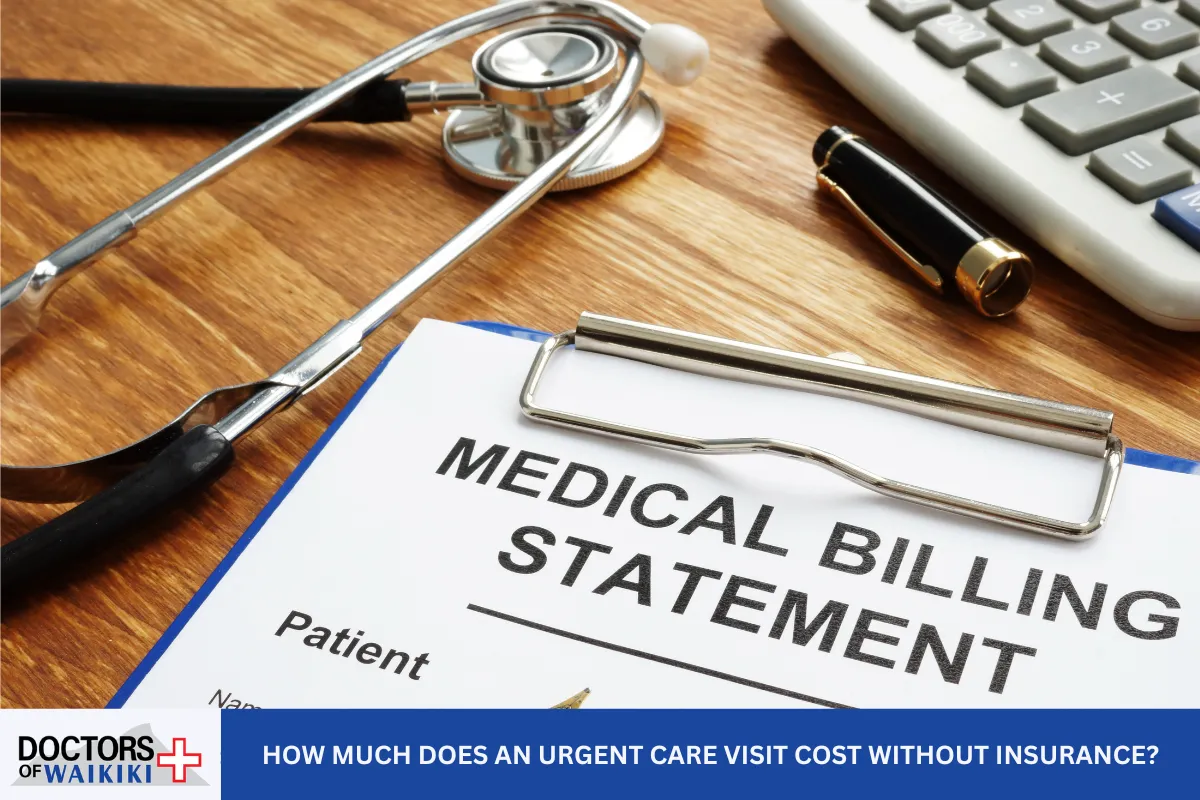
Typical Fees and Self-Pay Pricing
The cost of an urgent care clinic visit in Honolulu—or anywhere in Hawaii—can range depending on the services provided. Here is what to expect:
- Standard visit (office fee): $120–$225 (sometimes more, depending on complexity).
- X-rays: $75–$300 per image.
- Lab work: $20–$150 for basic tests (urinalysis, strep, flu, COVID testing, pregnancy tests), but blood work or more advanced laboratory services can cost up to $150 or more.
- Procedures: Sutures for cuts, splinting for a muscle and joint strain, or minor wound care may cost $50–$400 or more. IV fluids, especially for dehydration, may add $100–$250.
- Vaccines and shots: Flu shots, tetanus, and other immunizations can cost $20–$50 each.
Some urgent care centers will post their cash prices online or provide a Good Faith Estimate by phone, so you can check ahead and manage your costs.
Self-Pay Discounts and Payment Options
- Self-pay/cash discounts: Many Honolulu urgent care clinics will reduce their price by 10–30% for patients who pay cash or pay at time of service. You don’t need to have insurance for these rates.
- Payment plans: While rare at urgent care, some providers may allow partial payment upfront and a payment plan if your bill is large. Always ask the front desk or billing office if you need help.
- Charity care and financial assistance: These programs are almost always run by hospitals, not urgent care clinics. If you need help paying your bill, a community health center may be a better option.
- Balance billing: If you have insurance (even if it’s out-of-network), you may still be responsible for your deductible, coinsurance, or copay, as well as any balance that insurance doesn’t pay.
What Are Your Rights as a Patient Without Insurance?
Rights at Urgent Care vs. Emergency Department
- At urgent care: You do not have a legal right to treatment if you are unable or unwilling to pay, unless the clinic is attached to a hospital or falls under rare local laws.
- At the ER: All hospital emergency rooms must screen and stabilize you if you have an emergency medical situation, even if you can’t pay up-front or lack insurance. This is federal law (EMTALA).
- Nondiscrimination: You can’t be denied care for reasons like race, gender, disability, or other protected categories, but you can be turned away for inability to pay at an urgent care.
What to Do If Denied
If you are denied non-emergency care at an urgent care clinic in Honolulu due to inability to pay, you have a few options:
- Ask for a payment plan or discount. Sometimes explaining your situation and asking for self-pay pricing helps.
- Seek care at a community or federally qualified health center (FQHC), which often have sliding scale fees based on your income.
- If you have a life-threatening emergency, go to the Emergency Department. Hospitals cannot refuse emergency care.
- Contact local organizations such as patient advocacy groups or the Hawaii Department of Health for help.
- Consider telehealth/virtual urgent care, which can be lower cost than an in-person visit for minor illnesses.
Insurance, Payment, and Billing: What to Expect at Honolulu Urgent Care Clinics
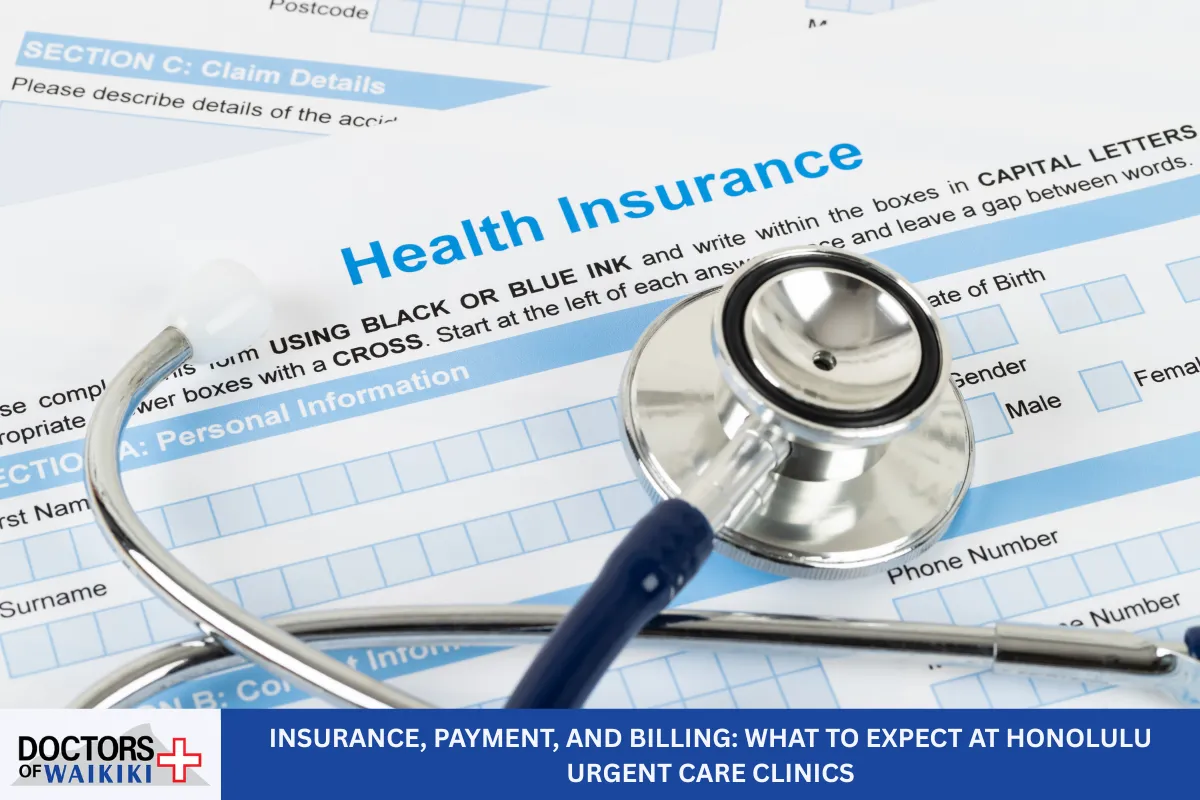
Accepted Insurance and Out-of-Network Rules
Most urgent care clinics in Honolulu accept multiple insurance providers, including major Hawaii plans such as UHA Health, HMSA, HMAA, Kaiser Permanente, Medicare, and Medicaid/QUEST. Always bring your insurance card for verification and to avoid higher out-of-pocket fees.
If the clinic is out-of-network for your plan, you may face higher deductibles, coinsurance, or balance billing. Always ask if your visit will be covered “in-network” for the lowest cost.
Copay, Deductible, and Coinsurance Explained
- Copay: A set fee (like $20–$60) paid at time of visit for insured patients.
- Deductible: The amount you pay each year before insurance starts paying (often $500–$2,000 or more).
- Coinsurance: After deductible is met, you pay a percentage (often 10–40%) of each bill; insurance pays the rest.
- Out-of-pocket maximum: The most you will pay for all covered services in a year before insurance pays for nearly everything.
Upfront Payment and Billing
- Upfront payment: Clinics may require payment for the expected cost of your visit before you see a provider, especially if you’re uninsured or have a high-deductible health plan.
- Itemized bill: After your visit, you should receive an itemized bill that breaks down services, procedures, lab tests, and other charges.
- Medical bills and debt: If you have trouble paying, communicate with the provider to request a payment plan or negotiate your bill.
- Work/school clearance and physicals: Fees for these services (like immunizations or physical examinations for a driver’s license) may not be covered by insurance and often require up-front payment.
Read Honolulu Urgent Care Centers: What Medical Services Do Urgent Care Centers Usually Provide?
Common Services, Hours, and Care Options at Urgent Care in Honolulu
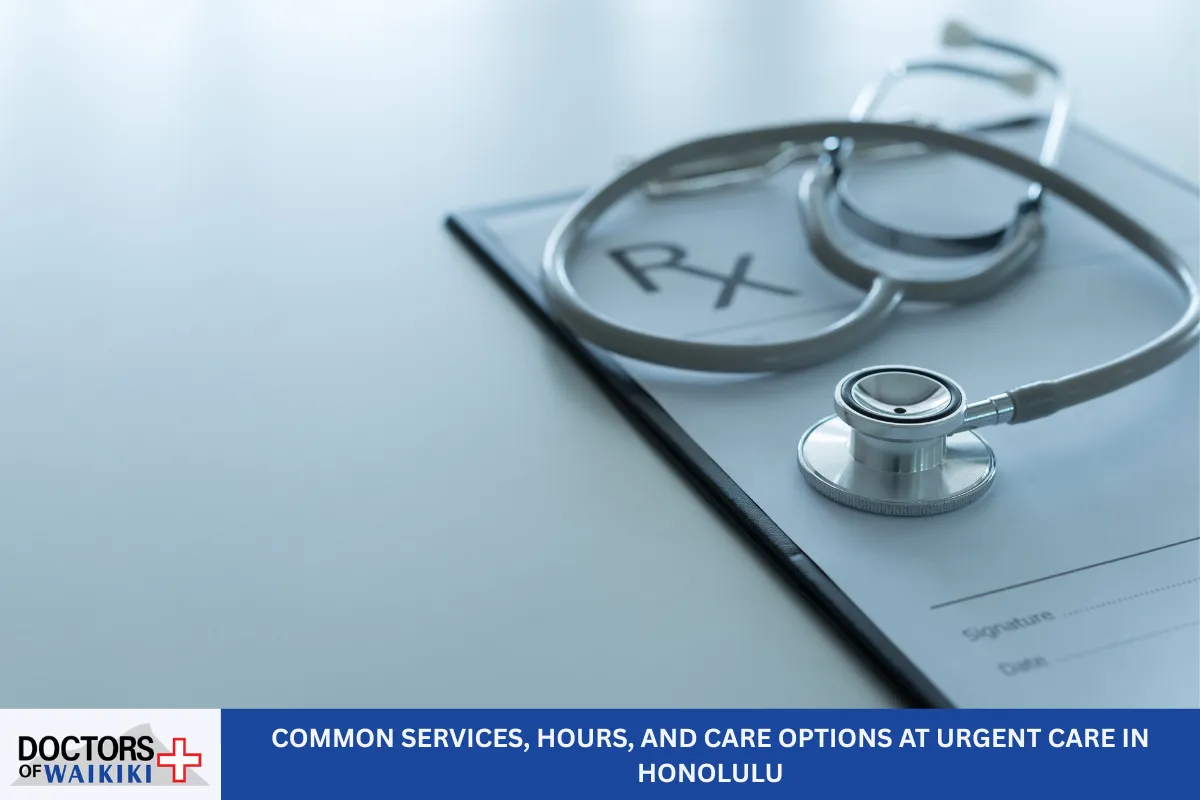
When to Choose Urgent Care vs. Emergency Room
Urgent care clinics are ideal for:
- Non-life-threatening injuries and illnesses (sprains, cuts, minor wounds, fever, coughs, cold or flu symptoms, sore throats, urinary tract infection, sinus infections, rash, pink eye)
- Minor orthopedic conditions: muscle and joint strain, knee pain, back pain, shoulder pain, fractured elbow
- Occupational health services: drug screens, work and school clearance, physical exams, women’s health services, men’s health
- COVID-19 testing, rapid flu or strep testing, laboratory testing, blood work
- Vaccines and immunizations (flu shots, Hepatitis B, tetanus, travel medicine)
- Prescription refills and follow-up visits
Emergency rooms are for:
- Life-threatening health issues (heart attack, stroke, severe bleeding, head injury, severe allergic reaction, serious injuries, advanced trauma, severe chest pain, loss of consciousness, severe burns, worsening symptoms of a chronic problem)
- If a reasonably person would think the condition is serious enough for emergency medical care
Average Wait Times and Hours
Honolulu urgent care centers generally offer walk-in visits with an average wait time of 15–45 minutes (varies by location and patient volumes). Many urgent care clinics—especially in Waikiki, Oahu, and busy tourist areas—are open evenings, weekends, and sometimes even 24 hours.
Services and Equipment
Urgent care clinics typically feature:
- X-ray machines, advanced laboratories for lab tests, and radiology services
- Medical tests and diagnostics, diagnostic imaging technology, lab equipment, and on-site blood draw
- Pediatric urgent care for children’s common illnesses and minor injuries
- Electronic medical records to keep your medical record organized
- Board-certified physicians, board-certified doctors, nurse practitioners, advanced practice providers, and a medical team including support staff and front desk staff to help you
- Minor procedures (IV fluids, stitches, splinting, orthopedic injury walk-in clinic)
- Specialty care referrals if you need to see a specialist later
Telehealth and Virtual Urgent Care Availability
Some clinics offer virtual urgent care—online consultations for minor illnesses, COVID-19 testing guidance, prescription refills, acute illness management, and advice about follow-up or emergency care instructions.
What If You Are a Tourist, Student, or Have No US Insurance?
Honolulu (especially Waikiki) sees many tourists and short-term visitors. If you have travel insurance or visitor insurance, check if your plan covers urgent care clinics—most accept major credit cards and will give you a detailed itemized bill to submit for reimbursement.
If you are a student or new resident, you can self-pay or seek sliding fee scale care at a local community health center.
For job injuries (work-related), urgent care clinics may bill your employer’s workers’ compensation insurance if appropriate.
Know Your Care Options: Hospital Emergency Room, Primary Care, and Urgent Care
- Primary care physician (PCP): Best choice for chronic diseases, preventative healthcare, ongoing medication management, women’s health, men’s health, mental health support, and preventive care. Visits may have longer wait times.
- Urgent care: For acute illness, non-emergency issues, minor injuries, after-hours walk-in visits, blood test needs, sports injuries, sinus infections, and pediatric care. Fast, affordable, and convenient for most non-emergency conditions.
- Emergency room: Only for life-threatening emergencies or severe health problems. Highest cost, longest wait time, but guaranteed by law to assess and stabilize you regardless of ability to pay.
Unique Features of Honolulu Urgent Care Clinics
- Many provide advanced diagnostic testing, x-rays, lab work, and specialty services on-site.
- You’ll find both local brands and large networks.
- Medications, antibiotics, vaccines, and even COVID-19 vaccines are available.
- Care is often faster and more affordable than emergency room care for non-life-threatening health issues.
- Be aware of wait times, walk in availability, and after-hours care, especially during flu season or peak tourist months.
Honolulu Urgent Care – Doctors of Waikiki
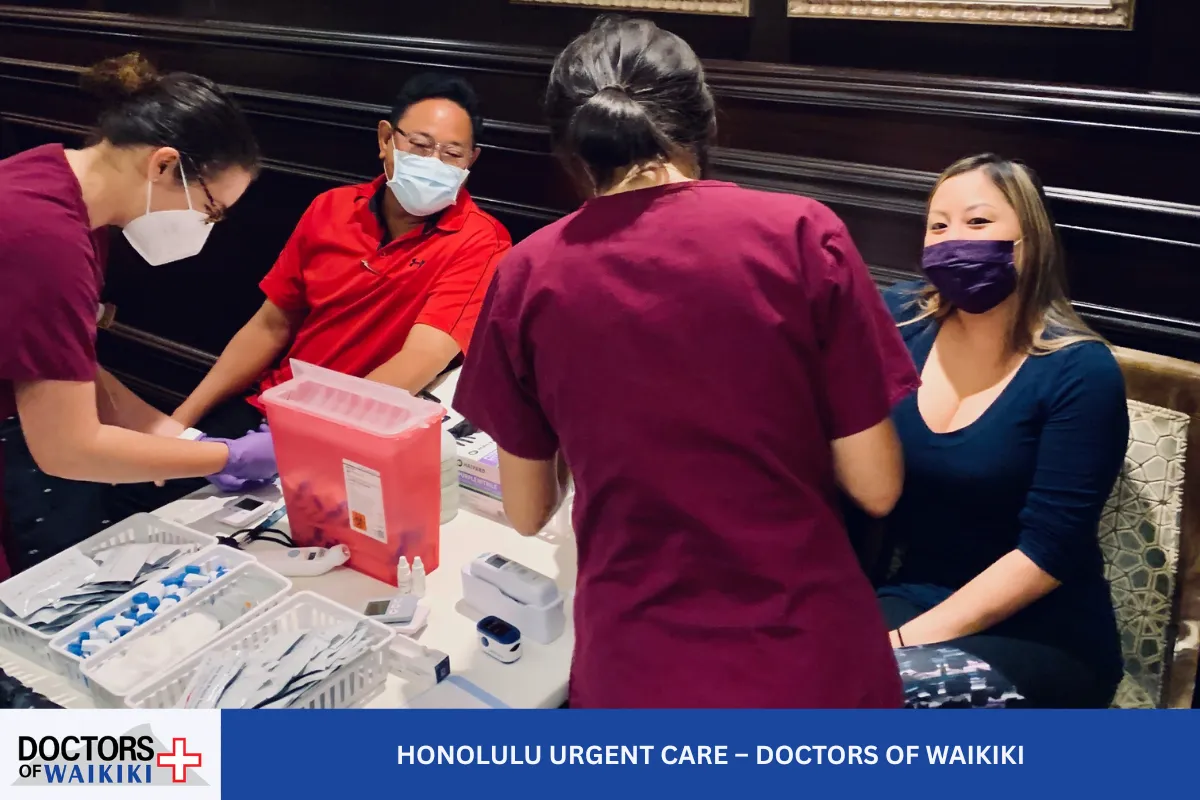
If you’re searching for “Honolulu urgent care” and worried about insurance, Doctors of Waikiki is here for you. We understand that medical issues—even minor ones—can be stressful, especially if you’re uninsured or visiting Hawaii. Unlike some clinics, we welcome walk-ins and offer transparent self-pay pricing and Good Faith Estimates so you know what to expect. Whether you need care for a cold, minor injuries, COVID testing, or lab work, we make quality healthcare accessible for locals, tourists, and students. Our experienced and friendly medical team is dedicated to getting you back on your feet—quickly and affordably.
Call us today at (808) 922-2112 to schedule a consultation or visit us in Waikiki. We proudly serve Honolulu, Hawaii!
Frequently Asked Questions
1. Can urgent care clinics in Honolulu help with lab tests and blood work if I pay cash?
Yes, most urgent care clinics in Honolulu offer lab testing and blood work for self-pay or uninsured patients. Common lab tests include rapid strep, COVID-19 testing, urinalysis, and blood panels. Prices typically range from $20 to $150 per test depending on complexity. Payment is generally required at the time of your visit. Some clinics may offer a self-pay discount. You will usually receive a detailed receipt and results that you can share with your primary care physician or for follow-up medical treatment. If you need advanced blood tests, confirm what is available before you go. For more extensive testing, a hospital lab may be required, possibly increasing cost.
2. What can I do if I have a high urgent care bill in Honolulu and can’t afford to pay?
If you receive a large medical bill for urgent care services, first ask about a payment plan. Most urgent care providers will let you pay your bill over time, often with no interest. Be upfront with the billing office or front desk staff about your financial concerns. You can also ask if they offer a self-pay discount for paying quickly. If you are unable to pay due to low income, ask if there is a local community clinic or hospital with financial assistance programs. For unaffordable medical debt, organizations like Patient Advocate Foundation offer guidance and negotiation help. Ignoring your bill may lead to collections, so it’s best to communicate early.
3. Will urgent care clinics in Waikiki see tourists or people with travel insurance?
Absolutely. Honolulu urgent care clinics commonly see tourists, students, and other visitors. If you have travel insurance, notify the clinic upon check-in; they can provide the documentation you’ll need to file a claim. Most urgent care centers accept credit cards and can provide a detailed itemized bill. If your illness or injury is not life-threatening, urgent care is usually much faster and less expensive than a hospital emergency department. For major emergencies, always go to the hospital Emergency Room instead.
4. Are there options for affordable urgent care or free clinics in Honolulu?
While most urgent care facilities require up-front payment, some community clinics and federally qualified health centers (FQHCs) in Honolulu offer medical care on a sliding fee basis. These clinics serve uninsured or low-income residents and can be a good alternative if you can’t afford urgent care self-pay rates. You may also find limited free clinics or one-day community health events. Always call ahead to confirm eligibility, hours, and services. For specialty care referrals or ongoing concerns, you may be directed to primary care services in the community.
5. How do I know if I should go to the ER or urgent care for my symptoms?
Use the rule of thumb: if your condition is dangerous, worsening rapidly, or could cause permanent harm (such as chest pain, severe allergic reaction, heavy bleeding, head injury, serious injuries, or difficulty breathing), go to the hospital emergency room immediately. For non-life-threatening health issues—like cold and flu symptoms, minor injuries, sore throats, small cuts, or upper respiratory issues—urgent care or a walk-in clinic is appropriate. Urgent care centers can handle X-rays, lab tests, sutures, and prescription refills. If you are unsure, most clinics offer virtual urgent care or phone triage to help you decide.
Takeaway: Navigating Honolulu Urgent Care Without Insurance
Honolulu urgent care clinics can legally require up-front payment or refuse care for non-emergency, uninsured patients—but there are still affordable, convenient care options available. Understanding what to expect with self-pay pricing, payment plans, and the differences between urgent care and ER policies empowers you to make the right health choices—whether you’re a local resident, student, or visitor on Oahu. From minor illnesses to preventative healthcare, urgent care offers patient-centered services for walk-in visits, but always remember: in a true emergency, hospital emergency rooms are required by law to help—no insurance required. Knowing your options puts you back in control of your medical treatment, no matter your coverage or financial status.

